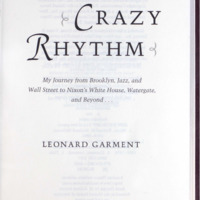-
Title
-
Crazy rhythm : my journey from Brooklyn, jazz, and Wall Street to Nixon's White House, Watergate, and beyond--
-
Description
-
Crazy Rhythm is a smart, swinging memoir that answers the question "How did a liberal Jewish jazz musician from Brooklyn become one of President Richard Nixon's most trusted advisers and one of Washington's most influential lawyers?" Leonard Garment was probably the hippest man ever to serve in the White House - a jazz musician with an affinity for artists, African-Americans, Jews, American Indians, and the "rabble-rousers" of post-1960s American politics, a man as.comfortable with Dick Gregory as he was with Dick Nixon. Garment presents a rare view of Nixon, showing us the man as he ascended to the presidency - brilliant, fascinating, and complex. Garment describes his advocacy on behalf of Israel at the United Nations, his efforts to expand government support for the arts, his crisis management of American Indian protests, and his ideological wrestling matches with Pat Buchanan. He also writes poignantly of his tumultuous first.marriage to Grace Albert, a talented television writer who, one day, mysteriously disappeared.
-
Identifier
-
680529
-
39458385
-
Creator
-
Garment, Leonard
-
Format
-
1st ed.
-
Source
-
Brian Lamb Booknotes Collection
-
Gift of Brian Lamb, 2011.
-
Catalog record
-
Language
-
eng
-
Date
-
1997
-
Program air date: April 20, 1997
-
Publisher
-
Times Books
-
George Mason University. Libraries. Special Collections & Archives
-
Text
-
Transcription of Annotations
Notes on front endpapers: age 74, b. May 11, 1924. Depression, Grace, Len, Len's mother, Len Panics p. 337. 1980 married Suzi. Moynihan, Bruce Llewelyn, William Kristol, Tim Russert. Colin Powell, Bibi Netanyahu. Jim Fallows--WASH Monthly article. Green Spring Farm, next door neighbor. Sy Hersh--p. 200. Nixon's 'Jew Boy'. Carter and Charlie Wick--praying in phone booth. Nixon statement McFarlane p. 360. Georgetown home--basement for Garment. Leukemia. Monthly poker game. Nixon small food p. 73 (Brooklyn meeting). Ed Williams--New York luncheon p. 75. Nixon--Supreme Ct. Hill v. Time p. 79. Bobst home--over the wall p. 85. Nix-'Never rush into a public place'. Ethel Kennedy/Alcatraz/phone call p. 224. Bryce Harlow--Civil War. Deep throat p. 249. Depression p. 255. 'I miss you' p. 299. Al Haig v. Garment p. 266. 'Burn the tapes'. Garment's father--bitter, estranged from his family. Nixon--phone manner, Ed Williams, Monica Crowley. John Osborne, Eric Severeid, Abe Fortas--for the pardon. Alan Greenspan, Saxophone intro to Nixon. Charlie Wick--taping phone calls. Jilly Carter on his knees. Lamb checks all but two of the chapter titles on the contents page as well as Thanks. Underlinings/Notes: Underlinings: Childhood, background, family, parents, music, Nixon, early career, mental health, politics. Notes: "Father's illness," "refused to see me," "mother's sanitarium," "Elmer Bobst," "breakdown" "New Masses," "Nixon's phone manner," "Jerry Hellman," "Colonel Warner," "Bullshit, Brooklyn meeting and speech," "hysteria," "small food," "certainty for President," "Ed Williams," "tapes burned," "Nixon on airplanes," "over the wall Bobst home," "China," "Black v. Fortas," "Elizabeth Hill suicide," "Abe Fortas pardon Nixon," "Rose Woods," "'Extremism'-Goldwater," "Gavin letter," "Nixon in conversation," "yellow pad," "stairwell," "12 hours Dick Gergory," "LBJ Manila," "full text N.Y. Times," "don't know how to lie," "Rabin," "Mitchell my idea," "not modest," "nuclear overreactor," "the photo," "M.L.K. the funeral," "Vietnam," "a Jew," "no ad agency," "TV image," "CBS," "Nixon's informality," "Harry Treleaven 'genius'," "Roger Ailes," "Graham approves the film," "telethons '68," "43% of vote," "McGinniss's book," "hatred of Nixon," "Political television," "Mayor Daley," "sad and lonely," "Seconal," "no longer inner circle," "Clark Clifford," "'ached' across the street," "intense dislike of Nixon," "White House operator," "Green Spring Farm, Jim Fallows," "Straight and Communist," "Sy Hersh," "Jew Boy," "Times did nothing," "Clarence Mitchell," "Buchanan," "Buchanan memos road to future," "Sequoia," "school deseg.," "tax exempt status, voting rights," "Harlow & Civil War," "Vernon Jordan," "Affirmative Action," "'dick'," "civil rights failure," "Ethel Kennedy phone call," "Moynihan Indian message July 8, 1970," "the caravan Nov 1," "bad taste left," "Wounded Knee," "Custer," "Mark Lane," "Malraux," "mystical evening," "June '72," "Deep Throat," "Counsel job," "You are untouched," "I was hopeless," "official role," "depression," "panic button type," "John Doar," "Al Haig," "point of blows," "Nixon about Richardson," "John Osborne," "my children," "WASH Post 'story spiked'," "Watergate," "feelings about Nixon," "tapes," "I miss you," "a shrink," "left Ford 1975," "Suzi Weaver," "Idi Amin," "Moynihan wins," "anti-Semitism," "Tim Russert," "Bruce Llewellyn," "Oakes wanted to endorse Azug," "Max Frankel," "Len panics," "1980 married," "Bob Wallach," "Charlie Wick," "Wick taping phone calls," "Jimmy Carter," "destroy tapes?" "Wick daughters," "Jacob Javits," "Toshiba," "Fiat, Kissinger," "McFarlane, Jean," "suicide attempt," "Nivon's statement to MAC," "screaming at Walsh," "trying to McFarlane on phone," "Manic explosion," "Mike Armstrong," "crying over Bork," "Linda Greenhouse," "David Shapiro," "Jonathan Pollard," "Tali Vriffel," "1989 Berlin/Munich," "Richard Nixon," "Marcos," "Monica Crowley," "Leon Wieseltier."
-
Subject
-
"Nixon, Richard M. (Richard Milhous), 1913-1994."
-
"Garment, Leonard."
-
"Watergate Affair, 1972-1974--Personal narratives."
-
Relation
-
Original Booknotes interview
-
Rights
-
This work may be protected by copyright laws and is provided for educational and research purposes only. Any infringing use may be subject to disciplinary action and/or civil or criminal liability as provided by law. If you believe that you are the rights-holder and object to Mason’s use of this image, please contact speccoll@gmu.edu.
 680529.pdf
680529.pdf